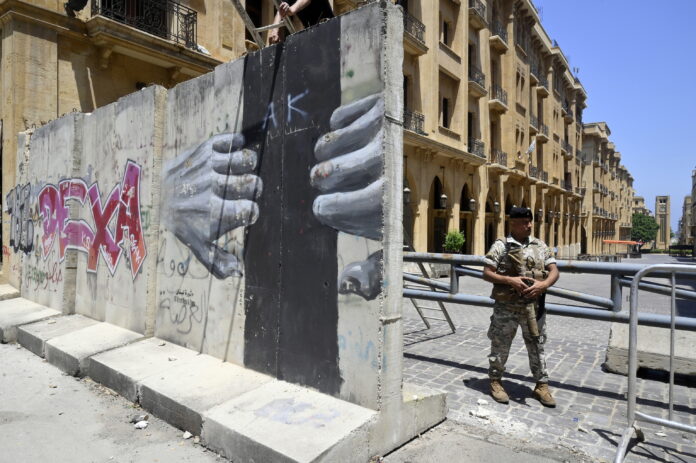The squares of a boiling Beirut were his tribune in 2019 and now the Lebanese Parliament will be his forum. There are more than a dozen new faces that have broken the conventions of the old politics in Lebanon. If in the October revolution the barbed wires prevented them from approaching the Legislative headquarters, this Tuesday, when the new deputies took possession of their seats, they finally managed to cross the barriers and sow the seeds of change.
Each of the 13 deputies affiliated with opposition and reformist lists who have won a seat in the May 15 elections can count a small feat. Mark Daou’s is to have put an end to the parliamentary career of Druze leader Talal Arslan. This ally of the Shiite militia Hezbollah and the Syrian government had been clinging to his ‘throne’ for three decades, during which time he even served as minister in six governments since the 1990s. ‘Warlord’ of one of the country’s Druze factions , is a descendant of Emir Majid Arslan, a feudal leader who in the last century played an important role in Lebanese independence from France. Although the roots of the Arslan – who rival the Jumblat, the other great Druze dynasty – go back through the centuries.
Arslan Jr. has kept the nickname ‘Emir’. Everyone in Lebanon calls him ‘the prince’. He has now been dethroned by a humble 43-year-old Communications professor: Mark Daou. “Public opinion is in favor of a radical change in the country. It is time to turn the page and start a new political phase, far from the logic of civil war and sharing the cake,” the brand new parliamentarian told the newspaper venue ‘L’Orient-Le Jour’. Daou participated in each of the demonstrations that besieged the political class when they broke out in October 2019. The street called for the resignation of the elites, whom he blames for the collapse of the country.
“October 17 changed the game. Before, we warred with the system for reforms. Today, we just want to end the system,” says Daou, who co-founded the Taqaddom (Progress) party in November of the year of the revolution. The formation advocates strengthening the sovereignty of the State, disarming Hezbollah – the only militia that has kept its rifles after the civil war – and establishing a secular system in Lebanon.
Halima El Kaakour has a doctorate in International Public Law and teaches at the Lebanese University. After being elected on May 15, she has become the only Sunni Muslim woman in Parliament. “We are planting hope and, God willing, we will collect change,” she anticipates excitedly to the Reuters agency. In the fall of 2019, she came face to face with the concrete barriers that were erected in the Legislative to prevent the demonstrators from approaching. “You didn’t allow us to enter Parliament as normal citizens? You blocked us and erected walls? Well, now we are entering as Members of Parliament,” she exclaims.
The rise of the reformist deputies was one of the surprises thrown up by the results of elections in which Hezbollah, Amal and their Christian allies from the Free Patriotic Movement – pro-Syrians – lost the majority they had amassed in the 2018 elections. They were far from the 65 seats necessary to dominate the Assembly (out of a total of 128 deputies), but together they continue to be a powerful alliance, adding affiliations of deputies who attend as independents.
Their rivals in the anti-Syrian camp, the Christian nationalist Lebanese Forces – allied with the Druze of Walid Jumblat’s Progressive Socialist Party – climbed the ranks as the largest Maronite force. But the vacuum created by the non-attendance of the main Sunni party, Saad Hariri’s Future Movement, leaves them somewhat sold. The result is a highly fragmented Parliament.
The priority now is to resolve the deep economic crisis gripping the country, where the local currency has lost more than 90% of its value and food, medicine and fuel are in short supply. “The essential thing now is to respond to the collapse of the standard of living… The battle is economic,” promotes Kaakour.
Elias Jrade is another of the faces of the revolution that is now entering Parliament. This eye surgeon has snatched the chair from a veteran Hezbollah ally in his own southern bastion. Asad Hardan, from the Syrian Social Nationalist Party and 70 years old, was one of the legislators who had been in office the longest: 30 years.
“No one would have ever believed that there would be a change in this part of Lebanon. We are telling them: ‘This is a symbol, I give you the torch and we hope you continue,'” Jrade transfers, through the specialized medium ‘Middle East Eye’ , to the new generations that are to come. He assures that he presented himself because his 16-year-old daughter urged him to join the demonstrations against the government after the explosion in the port of Beirut in the summer of 2020, which devastated the Lebanese capital and left a trail of more than 200 dead and 6,500 wounded.
Hezbollah adds notorious casualties: Another great loser in the southern stronghold of the Shiite militia-party is Marwan Jeireddin, president of the AM Bank and with another three decades on the back of parliamentary and feudal privileges. Firas Hamdan, a 35-year-old lawyer who was injured in the chest during the 2020 demonstrations, took over Hasbaya’s seat. “One of the victims is in Parliament to bring the voice of those who are outside and claim their rights,” he claims.
On the dark side of the coin, two legislators accused of being involved in the Beirut port disaster have been re-elected. They are Ali Hasan Jalil and Ghazi Zetaier, both from Amal, who remain in their fiefdoms due to the discomfort of the victims of the tragedy. They fear that they will continue to obstruct the investigation into why tons of ammonium nitrate were stored for years without security measures, from their posts.
Nabih Berri, chief of Amal, was also re-elected yesterday as president of Parliament. At 84 years old, this former ‘lord of the war’ during the Lebanese fratricidal conflict, has held this position – which the quota system reserves for Shiites – since 1992 and this is his seventh term.
Conforms to The Trust Project criteria








